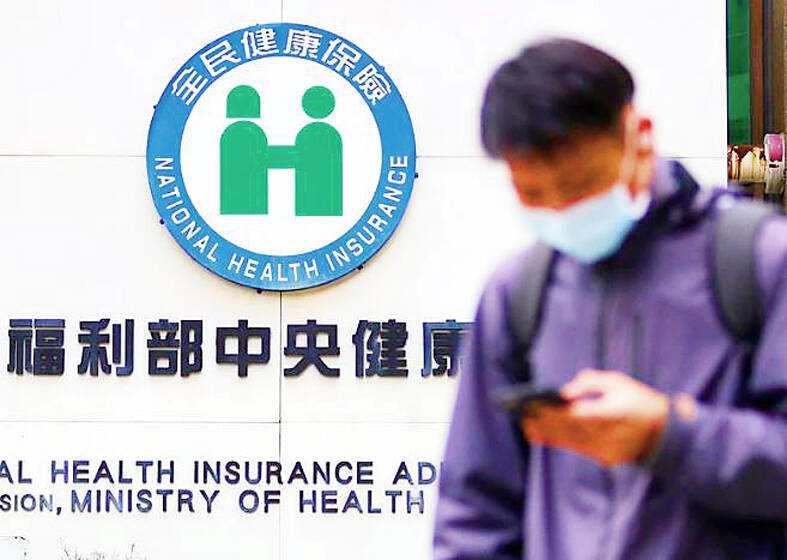People with two types of cancers who need treatment costing millions of New Taiwan dollars are now covered by the National Health Insurance (NHI) system.
From Nov. 1, people with B-cell acute lymphoblastic leukemia (B-ALL), one of the most common types of childhood cancer, or relapsed or refractory diffuse large B-cell lymphoma (DLBCL) are covered if they meet certain criteria, the National Health Insurance Administration (NHIA) announced last month.
The therapy for people with these cancers takes T cells and modifies them with chimeric antigen receptors (CARs) so that they can recognize and destroy cancer cells.

Photo: CNA
It costs about NT$8.19 million (US$253,537), said Huang Yu-wen (黃育文), director of the NHIA’s Medical Review and Pharmaceutical Benefits Division.
Given the cost, the NHIA has limited coverage to two types of cancer patients and a period of up to two years, but discussions are to be held to decide if the coverage should last longer, NHIA Director-General Shih Chung-liang (石崇良) said.
The Food and Drug Administration previously approved the use of CAR T cell therapy for all people with B-ALL aged 25 or under and for people with DLBCL whose cancers have relapsed or not responded to first or second-line treatments.
To be eligible for NHI coverage under the new program, people with B-ALL must be aged 25 or under, have leukemia that has not responded to other treatments, have relapsed after a bone marrow transplant or have had more than one relapse.
People with DLBCL are eligible for coverage if their cancer has recurred or not responded to treatments considered to be second-line or higher.
Huang Wei-han (黃威翰), deputy director of Hualien Tzu Chi Hospital’s Cell Therapy Center, said that 15 to 20 percent of young people with B-ALL have relapses, and only 30 to 50 percent of those who have relapses survive for five years.
About half of adult cases relapse, and only 10 percent of them survive for five years, he said.
Last year, a 10-year-old girl who had been battling B-ALL for more than four years became the first person in Taiwan to be successfully treated using CAR T cell therapy, Huang said.
Meanwhile, bone marrow transplants do not work for roughly half of all people with DLBCL, and those diagnosed with a cancer that has not responded to treatment or whose cancer has relapsed after a bone marrow transplant have only a 20 percent chance of surviving for two years, he said.
Huang Tai-chung (黃泰中), an attending hematology physician at National Taiwan University Hospital and secretary-general of the Hematology Society of Taiwan, said that 40 percent of people with DLBCL become completely cancer free after receiving CAR T cell treatment, while 13 percent are partially cured.
“Even if their cancer is only partially cured, it means a lot to the patients,” because it can help prepare them for the next stage of treatment, he said.
Sixty percent of people with B-ALL whose bone marrow transplants have failed can be completely cured with CAR T cell treatment, Huang Tai-chung said.
People can receive CAR T cell treatment at seven hospitals in Taiwan: National Taiwan University Hospital, National Taiwan University Cancer Center, Linkou Chang Gung Memorial Hospital, China Medical University Hospital, Taichung Veterans General Hospital, Kaohsiung Medical University Chung-Ho Memorial Hospital and Hualien Tzu Chi Hospital, Shih said.

Taiwan is to commence mass production of the Tien Kung (天弓, “Sky Bow”) III, IV and V missiles by the second quarter of this year if the legislature approves the government’s NT$1.25 trillion (US$39.78 billion) special defense budget, an official said yesterday. Commenting on condition of anonymity, a defense official with knowledge of the matter said that the advanced systems are expected to provide crucial capabilities against ballistic and cruise missiles for the proposed “T-Dome,” an advanced, multi-layered air defense network. The Tien Kung III is an air defense missile with a maximum interception altitude of 35km. The Tien Kung IV and V

The disruption of 941 flights in and out of Taiwan due to China’s large-scale military exercises was no accident, but rather the result of a “quasi-blockade” used to simulate creating the air and sea routes needed for an amphibious landing, a military expert said. The disruptions occurred on Tuesday and lasted about 10 hours as China conducted live-fire drills in the Taiwan Strait. The Civil Aviation Administration (CAA) said the exercises affected 857 international flights and 84 domestic flights, affecting more than 100,000 travelers. Su Tzu-yun (蘇紫雲), a research fellow at the government-sponsored Institute for National Defense and Security Research, said the air

Trips for more than 100,000 international and domestic air travelers could be disrupted as China launches a military exercise around Taiwan today, Taiwan’s Civil Aviation Administration (CAA) said yesterday. The exercise could affect nearly 900 flights scheduled to enter the Taipei Flight Information Region (FIR) during the exercise window, it added. A notice issued by the Chinese Civil Aviation Administration showed there would be seven temporary zones around the Taiwan Strait which would be used for live-fire exercises, lasting from 8am to 6pm today. All aircraft are prohibited from entering during exercise, it says. Taipei FIR has 14 international air routes and

Taiwan lacks effective and cost-efficient armaments to intercept rockets, making the planned “T-Dome” interception system necessary, two experts said on Tuesday. The concerns were raised after China’s military fired two waves of rockets during live-fire drills around Taiwan on Tuesday, part of two-day exercises code-named “Justice Mission 2025.” The first wave involved 17 rockets launched at 9am from Pingtan in China’s Fujian Province, according to Lieutenant General Hsieh Jih-sheng (謝日升) of the Office of the Deputy Chief of the General Staff for Intelligence at the Ministry of National Defense. Those rockets landed 70 nautical miles (129.6km) northeast of Keelung without flying over Taiwan,